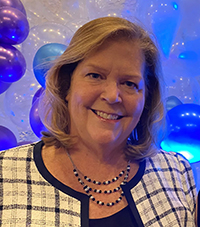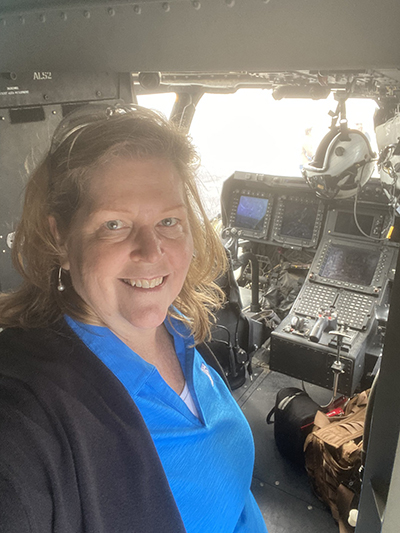
Industry Advisory Board Profile: Kathryn Elliott
Elliott on finding inspiration in gas turbine engines, restarting her career and being a change agent.

Elliott on finding inspiration in gas turbine engines, restarting her career and being a change agent.

Michigan Aerospace had the delightful opportunity to sit down with U-M Alum and Aerospace Industry Advisory Board member Kathryn Elliott recently to learn more about her. Our series of Women in Aerospace is inspired not only by Aero alums but by the multitude of women who walked the halls and U-M and paved the way for others during their successful careers.
Elliott serves as a wonderful example of just that.
Finding her focus
Kathryn Elliott’s path toward aerospace was not a direct one. She graduated as a mechanical engineer from the University of Michigan in 1983, a major she chose because it offered an 18-year-old Elliott, who knew very little about engineering, the flexibility to pursue the widest number of engineering options. As she began her studies at U-M, she began to gravitate toward thermodynamics. The more she looked into power generation, such as automotive, nuclear and steam generation, the more she got hooked. Until one day, she fell in love. When she discovered gas turbine engines, it was like she’d found her soulmate.
“It was seriously an epiphany, and it has stuck with me through my whole life,” Elliott said.
A most successful marriage, with 38 years of a career dedicated to gas turbine engines later, Elliott is still in love. She started out working for Teledyne CAE, a Defense contractor making gas turbine engines that powered missiles, decoys and small trainers. However, 8 years into her career, her rapid career ascent took a turn as the Cold War ended, the Berlin Wall came down and with Perestroika, peace broke out. US Defence budgets were drastically reduced and massive layoffs ensued, which eventually included Elliott. She and her husband decided to start their family and Elliott had two children in two years while she kept busy dabbling in different career paths based on her volunteer interests – music, teaching, and serving in her church and community. When Teledyne asked her to come back part time, it reaffirmed that her true love indeed remained in engineering and gas turbine engines.
“I started working two or three days a week. To me it was easier to work a full day rather than half days because the biggest hurdle was getting ready for work and out of the house with 2 babies…. Long story short, what was originally offered as a temporary three-month part-time position turned into 10 years!”
During those 10 years in the 90’s, Elliott had a third baby and worked part time when most new moms were only offered 2 choices: work full-time or not at all. While the part-time arrangement was a unique blessing it still came with a price.
“It was definitely the classic ‘mommy track’ scenario where you’re putting in 10 years, gaining valuable experience and increasing leadership responsibilities with little raise and no promotion. It was just a career plateau,” she said.

Elliott still feels like this was a choice not offered to many women and she willingly accepted the terms with no regrets – having the best of both worlds in spending valuable time with her children while staying active in engineering, despite the long term impact to her career. However, her tenaciousness and determination allowed her to gain a lot from those years. She worked in different areas of the company, doing everything from early concept work to development and production. Although these weren’t opportunities for recognition and reward at the time, Elliott gained valuable skills that set the stage for future successes.
When her youngest child entered 1st grade, she applied for a full-time role at Rolls-Royce in Indianapolis, IN. “I got the job, in part due to several current employees that could vouch for my abilities. But I felt as though Rolls-Royce was taking a chance on me because here’s a woman who had been working part time for 10 years and I’m not sure they were fully convinced that I was going to stick with it…., but they did take that chance on me, for which I’m so grateful.”
17 years later, Elliott is the Defence Sector Capability Manager for Performance and Aerothermal Systems, which includes the Engine and Aircraft Performance, Installations Aero, Noise and Engine Environmental Protection capabilities covering both the Rolls-Royce Indianapolis operation and the Defense site in Bristol, England. These system-level capabilities involve modeling the thermodynamic, aerodynamic, acoustic and environmental aspects of the engine systems.
To this day, she recalls how tough the engineering classes were at U-M and recognizes that this was one of the best ways in which the university prepared her for her outstanding career. Despite the individuality of the academic program at that time, Elliott recalls how she and her classmates formed a team and supported each other throughout their studies, which is one of the things she most enjoyed about her undergraduate degree.
“It’s funny, I went into engineering because I didn’t really like working with people. But the irony is that you absolutely cannot be a successful engineer without also having good people and teaming skills. I have changed 180 degrees,” she said.
One thing she wished she was taught as a student was how much engineering is involved in the operation and maintenance of the actual products. The focus in school is heavily weighted towards the design of new products, while in aerospace you often find products that are in operational service for 30-50 years! Engineering for maintenance and repair, field support, understanding how your product is operated (versus what you designed it for!) and learning how to retrofit designs with modular upgrades should get more attention since it’s likely that you’ll spend a good bit of your career in those areas. These are every bit as challenging and rewarding as new design tasks with closer customer interactions which I’ve especially enjoyed.
In reflecting upon her career, Elliott considered the effects being a mother had on her profession. Despite her talent and persistence, the ripple effects were felt throughout her professional life.
“Even now, I feel the effects of that mommy track. I feel like I’m about 10 years behind other engineers my age. The peers that I work with are at least 10 years younger than me… But when I made that decision early on, I made it with my eyes wide open, understanding the long term impacts it was going to have in my career. And I’m still very much OK with that. It’s important to be able to have choices so that you can make the right choice for you and your family, whatever that may be.”
Is this the natural order of things? Are women doomed to be torn between having children or a career? Elliott doesn’t think so.
“It’s been the traditional order of things, but it doesn’t necessarily have to be the natural order,” she said. “There’s so much more that companies can do to enable their valuable female talent to be successful.”
Elliott was instrumental in starting Rolls-Royce North America’s first Employee Resource Group (ERG), the Rolls-Royce Women of North America. One of the first things they did was make sure that the company was compliant with the law around providing nursing mothers appropriate facilities to pump and store their milk. They installed new, clean rooms with electricity for electric breast pumps, a sink for sanitation and refrigerators for storing milk in every facility. Elliott recalls using a bathroom stall as a new mother herself and is really pleased that is no longer something new mothers face today.
Through this ERG Elliott also helped to influence the creation of company parental leave policies. Lacking a US national requirement for maternal leave, it was common to use a combination of PTO (paid time off), short-term disability and FMLA (Family Medical Leave Act) to cover maternity leave with varying levels of pay. Recognizing that supporting women often means balancing support for men as well, the Rolls-Royce policy now offers a 12-week paid maternity leave and 6 week paid paternity leave for births or adoptions. In addition, there is now a paid leave policy for employees involved in caregiving activity for family members.
Elliott’s impact through her experience continues today as she mentors and coaches colleagues, drives growth in understanding inclusion at Rolls-Royce, speaks at SWE conferences, chairs the Diversity Equity Inclusion committee in the Prognostic Health Management Society and serves in advisory roles at U-M Aerospace.